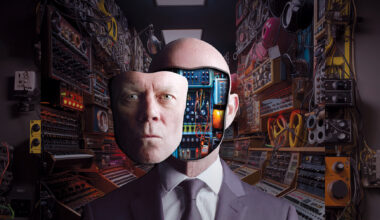Home to a bunch of upcoming young gun composers working to blur the lines between electronic and classical music, 130701 Records celebrates itS 15th anniversary this month. Whatever happened to Max Richter, Hauskcha and Jóhann Jóhannsson, eh? Dave Howell, the man at the controls, tells the label’s tale
Back in 2001, long before the world went dreamy-eyed for neo-classical, that intriguing meeting point of composerly discipline and electronic experimentation, a little record label tucked away in a quiet corner of Brighton was sparking up a match and wondering what might happen. An offshoot of FatCat Records, the 130701 imprint (more about the name in a moment) is where Max Richter first made inroads with the release of his genre-defining ‘The Blue Notebooks’. It’s where classical pianist Hauskcha found an outlet for his groundbreaking “prepared piano” pieces. It’s where the Oscar-nominated composer Jóhann Jóhannsson once called home.
From their beginnings as a record shop in Crawley, West Sussex, FatCat became the unofficial nerve centre for the rapidly expanding and mutating UK electronic music scene of the early 1990s. In more recent times, it has championed the likes of Sigur Rós, Múm, Frightened Rabbit and Animal Collective. The company has had an eventful history and 130701 boss Dave Howell has played an important part in that, having sat at the top table alongside founders Dave Cawley and Alex Knight for almost 20 years. A graphic designer by trade (his fanzine ‘Obsessive Eye’ was stocked by the shop), Howell joined the team to help with the fledgling record label when a whopping rent hike saw the store close its doors in 1997.
As well as creating much of the company’s artwork, Howell was responsible for many of FatCat’s most innovative moves. He conceived and oversaw the ‘Split Series’ releases, a sporadic run of 12-inch singles featuring artists pitting their different sounds and styles against one another. From there, he developed the Splinter Series imprint, taking great pleasure in what he describes as the “destabilising excitement of noise and the anchoring pull of pop hooks”.
But it’s Howell’s work with 130701 that has really made a mark. The label was set up in 2001 (around the time that the FatCat mothership moved its HQ to Brighton), with just one aim – to release ‘Sings Reign Rebuilder’, the debut album by Canadian post-rock supergroup Set Fire To Flames. Fifteen years on, the label has become a vibrant and vital nucleus for a growing scene of composers and musicians who were often previously operating in isolation. The release of ‘Eleven Into Fifteen’, a compilation of 11 exclusive tracks from the artists who have been signed to 130701 over the last decade and a half, proves the point.
Dave Howell, it would seem, has a lot to answer for. And we have a lot to ask him.
130701 is celebrating 15 years in business. Do you ever wish you had given it a more sensible name?
“I do actually like the slightly cryptic, awkward name we picked, although I think it confuses the hell out of people as to how to verbalise it,” says Dave Howell. “It’s thirteen-oh-seven-oh-one.”
It all makes perfect sense when you realise it’s the date the label was formed…
“I like its totally unpretentious grounding in just being a date, rather than trying to encapsulate something through verbal associations or allusions.”
What was the original plan?
“There was never a plan. 130701 was set up purely to release the first Set Fire To Flames album, which for political reasons had to be separated from the main FatCat label. There wasn’t the slightest inkling that it would become some kind of modern classical imprint. It wasn’t until two or three releases down the line, after albums from Sylvain Chauveau and Max Richter, that we started to conceive of any kind of coherent aesthetic.”
How much of a curveball was it to have an offshoot that paddled in classical waters?
“When you look through its history, FatCat has been one massive splattery succession of curveballs. The record shop occupied a very influential position in electronic music. It had strong links with people like Underground Resistance, Jeff Mills and Carl Craig. It was also somewhere that really helped push the early UK electronica scene. So when the shop closed and the label started, I think a lot of people expected it would be mining that same vein. But right from the off, we were trying to escape easy classifications by releasing improvised hip hop, guitar music and harsh noise stuff like Merzbow, as well as electronic records. Then came the singer-songwriters, the folk bands, the indie bands… So it’s been a constant process of shredding preconceptions, shedding skins, growing new limbs.”
You seemed to blaze trails, if you’ll pardon the pun, with Set Fire To Flames. Or was that sort of work always around and we just didn’t notice?
“Set Fire To Flames didn’t suddenly appear fully formed out of nowhere. They sit within that Godspeed, Silver Mt Zion, Fly Pan Am axis from which they emerged. You can also look back to a bunch of utopian freak-out stuff, to the work of 1960s American avant-garde composers like La Monte Young and Tony Conrad, to some 70s krautrock and bands like Harvester and Träd Gräs Och Stenar, to more contemporary artists like Jackie-O Motherfucker, the No-Neck Blues Band and Boxhead Ensemble… so SFTF weren’t without peer or precedent. What was unique and fresh about them was the collective nature of the group and how the wide range of their various influences and backgrounds combined and meshed together.”
You also championed Max Richter’s ‘Memoryhouse’, reissuing a record that had pretty much killed the BBC’s Late Junction classical music label in 2002. What did you know that the BBC didn’t?
“Ha! Yeah, I wonder if someone there is feeling sore about the way that turned out? I don’t think we knew anything for sure, we just heard someone doing something interesting and forceful and intelligent, and that ticked a lot of boxes. All three of our first artists – SFTF, Sylvain Chauveau and Max Richter – had some grounding in the wider scenes FatCat was operating in. They were all using electronics and had an experimental approach to music at some level. SFTF included seven members of Godspeed You! Black Emperor, Sylvain had one foot in the electro-acoustic world, and Max had worked with Future Sound Of London and Roni Size. So it’s not like we suddenly started putting out academic classical material that had no connection to other things going on in the wider label.”
And then you were joined by Hauschka and Jóhann Jóhannsson. It’s no surprise people have called the label pioneering, is it?
“It is flattering, of course, and I guess it feels like a vindication that what we were doing was significant, but it also seems pretty rare to hear that sort of praise. We haven’t had much label-focused press through the years. When the wave was starting to break for this sort of music, the period from around 2012 to 2015, we’d gone into lockdown and we weren’t able to release anything. We had to pretty much sit on our hands and watch as others got the attention.”
What was the reason for this “lockdown”? It must have been difficult, to say the least?
“I can’t really go into the details of why we fell dormant, but it was not voluntary. Just prior to that happening, 130701 was in brilliant creative health. We’d signed Jóhann Jóhannsson and Dustin O’Halloran, we had Sylvain Chauveau, Max Richter, Hauschka… that looked like a seriously stellar roster. But then 130701 got caught bang in the middle of this dispute. We weren’t able to release anything, so ultimately we had to let the artists go.”
And the timing couldn’t really have been worse…
“It came exactly as the wave was breaking for the new classical genre, and people like Olafur Arnalds and Nils Frahm and labels like Erased Tapes came sailing through. It was a massive blow for us and it has taken a big effort to recover from it. We had two or three years in limbo and we have had to rebuild a roster pretty much from scratch. It took a while to find the positive energy to re-emerge after a kicking like that, but I feel we’re starting to get back to a good place again and there’s lots to feel hopeful and excited about.”
What do you look for in new artists? Is there a 130701 sound or style?
“I think you can see that in some of the new signings, in people like Ian William Craig, who’s a classically trained vocalist processing himself through tape loops and degradations, and Resina, an improvising cellist whose material is very layered and sprawling. They’re both great performers, both really interesting, and they will help take us to new places.”
Knowing what you know now, what advice would you give yourself about 130701 if you could pop back 15 years for a chat?
“I’d probably make sure I had a little word with the guys who look after the legal side of things! I’d also say we should have paid more attention to giving 130701 an identity that was separate from FatCat and not waited 15 years to give the label its own website and social media networks. I don’t know if I’d have done anything different creatively, though.”
If you had to pick one record released on 130701, which one would it be?
“Man, that’s pretty tough… but if you were to force me, I’d say ‘Sings Reign Rebuilder’, the first Set Fire To Flames album. It’s probably the record that least fits into the post-classical mould the label has become associated with and I think SFTF are the act that the classical crowd find the most challenging, but it was our debut release and it’s also the one that chimes most closely with my own sensibilities. I just love how broad and intense it is. It’s had so much spirit and love invested into its creation. As a physical thing, the packaging is amazing. As an expression of a particular place and time, it’s conceptually really tight. It’s kind of hard to tire of a record when there are so many different angles to explore within it. As an end to end listen, it’s also a truly incredible journey.”






